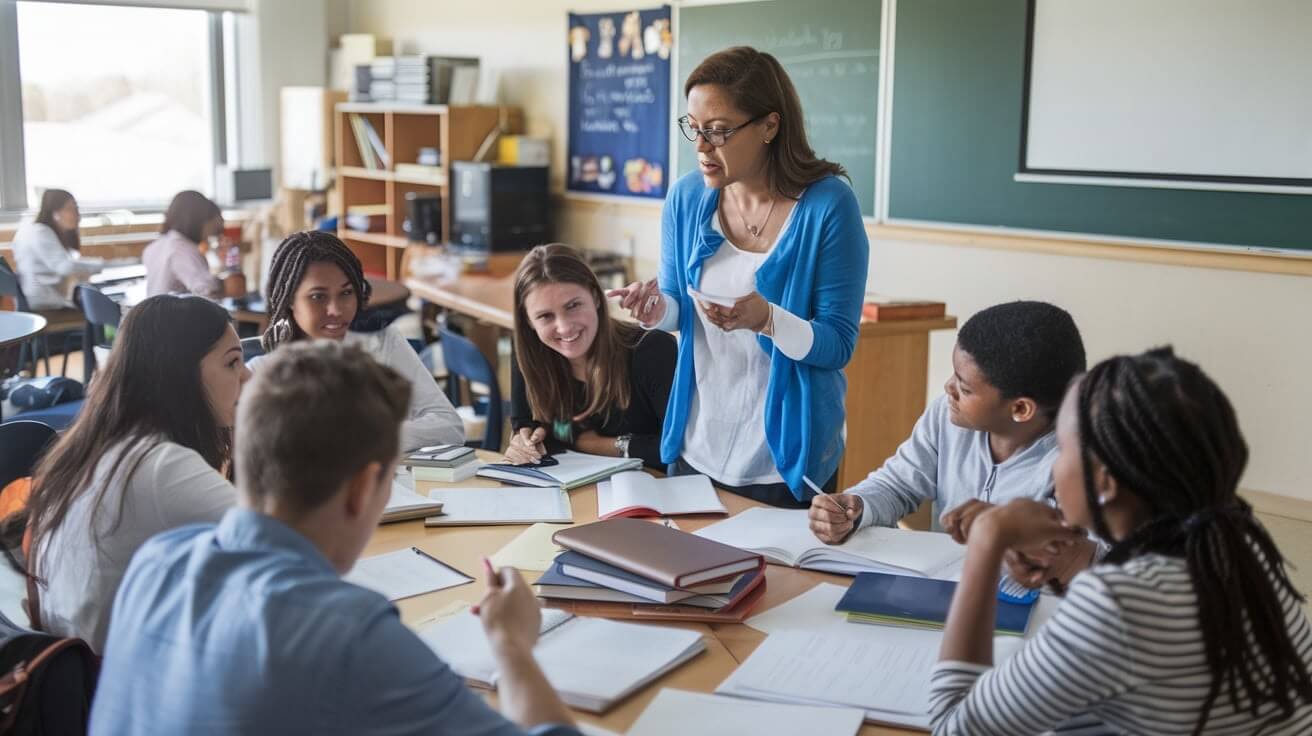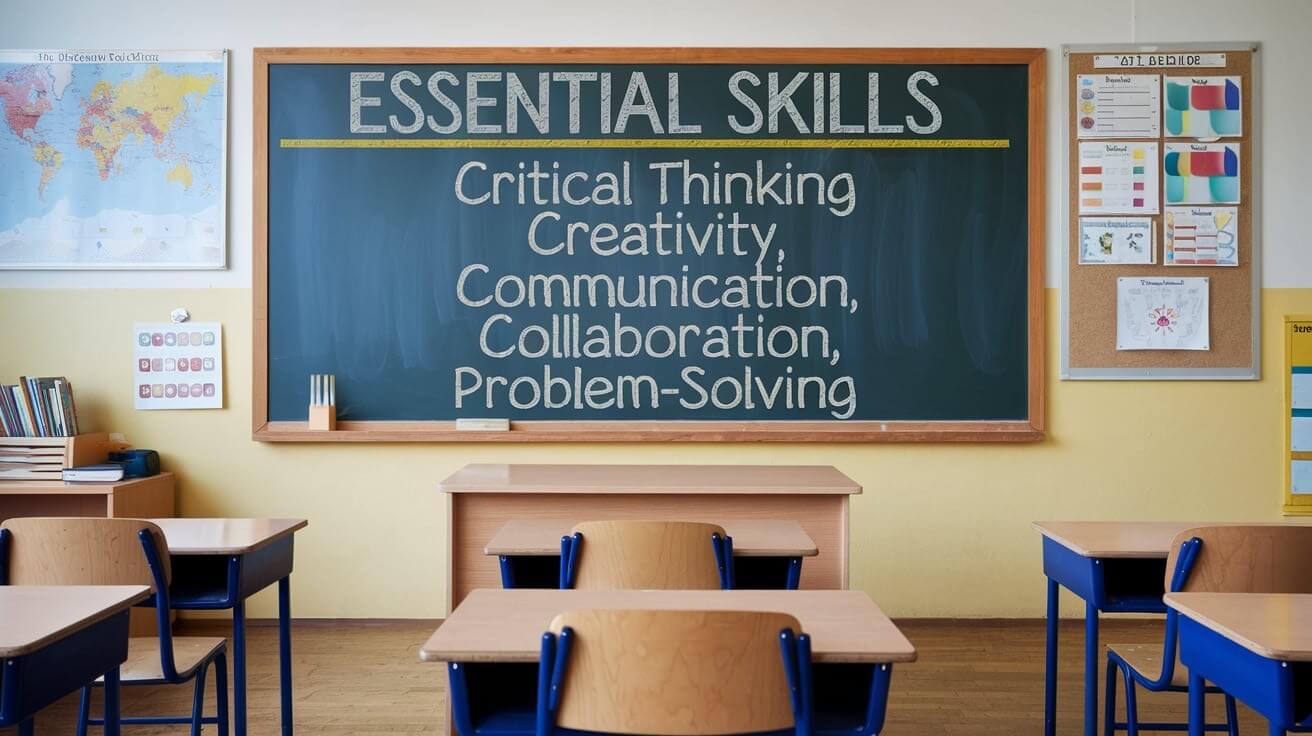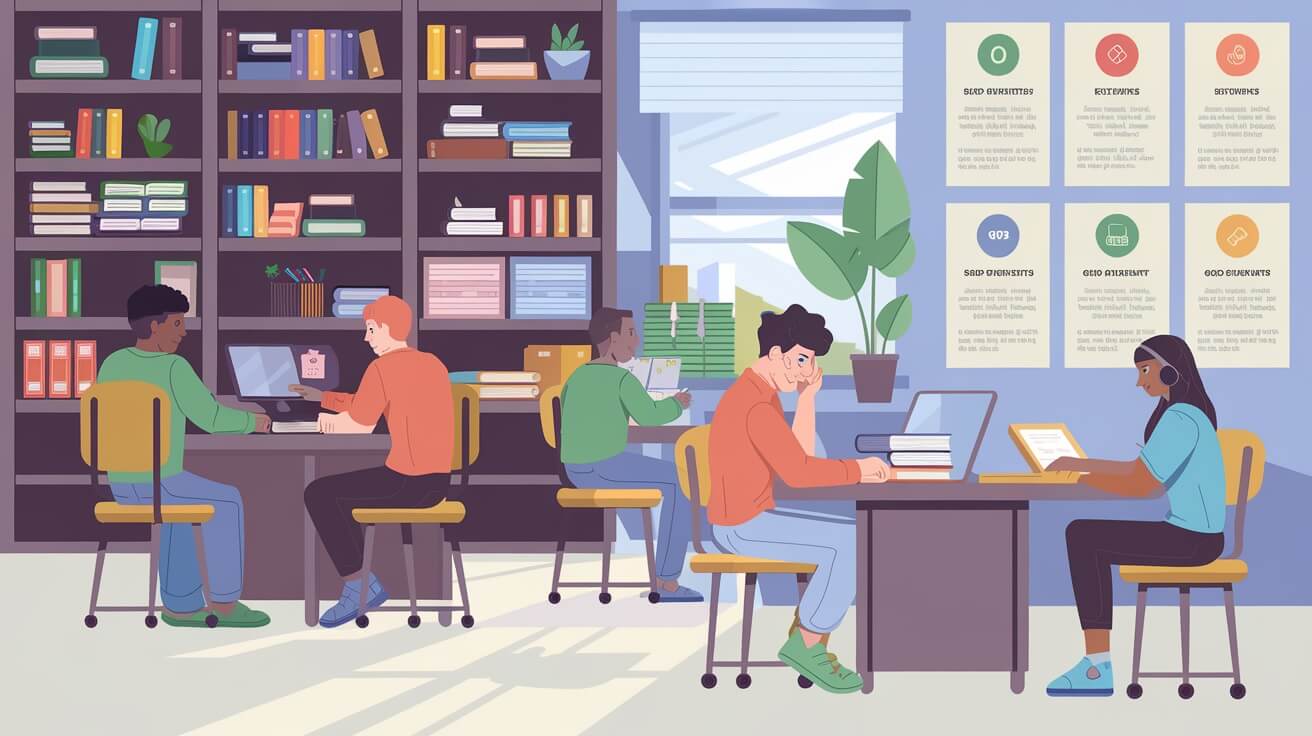
Essential Learning Skills for Academic Success
Do you need help with your studies, or are you finding it hard to keep track of everything you need to learn? You're not alone. Many students need help managing their time, staying focused, or even figuring out the best study method. The good news is that learning skills are just that—skills. And like any skill, they can be developed and improved.
This article delves into practical strategies and tools to help you excel academically. This guide covers mastering time management and leveraging tools like spaced repetition. Let's explore these proven methods to make learning more effective and rewarding.
Understanding Learning Skills
What Are Learning Skills?
Learning skills are practical techniques and strategies that empower you to absorb, process, and apply knowledge effectively. Think of them as the tools in your academic toolkit, helping you navigate the often overwhelming demands of education.
These skills aren't just about memorizing facts—they involve deeper, more holistic habits like managing your time efficiently, organizing your thoughts, staying focused even during distractions, and adapting to new information or challenges.
For instance, imagine tackling a complex math problem. Instead of jumping in without direction, students with well-honed learning skills break the problem into smaller, manageable steps, draw connections to related concepts, and apply critical thinking to evaluate different solutions. This systematic approach makes learning feel less overwhelming and more achievable.
Why Are They Important for Academic Success?

Learning skills are more than just academic aids—they are lifelines for success. They help you streamline your efforts, making even the most challenging subjects manageable. Research consistently shows the power of effective learning habits.
For example, a National Center for Education Statistics study found that students with strong study habits achieve 30% higher grades than their peers who lack these foundational skills. Beyond grades, these skills also reduce stress, giving students a sense of control over their workload and a clear strategy for tackling tasks.
Improving your learning skills doesn't mean putting in more study hours; it means making the hours you spend significantly more productive.
Imagine how much easier it would be to prepare for exams if you had a structured study plan, effective note-taking methods, and tools like spaced repetition to help with long-term retention. These strategies simplify learning, saving time and energy while ensuring better results.
Moreover, good learning skills set you up for success beyond the classroom. They are transferable abilities that can be applied to virtually any area of life, from solving problems at work to managing personal projects.
By mastering these techniques, you'll improve your grades and invest in a skillset that will benefit you for years.
Essential Learning Skills for Students

1. Time Management
Time management is the foundation of academic success and a skill that can transform how you approach your studies. Proper planning makes it easy to avoid a cycle of procrastination, missed deadlines, and last-minute cramming.
This hampers performance and significantly increases stress levels, leaving you overwhelmed and unprepared. However, managing your time becomes straightforward and empowering with the right strategies.
What Works?
Plan Ahead:
A well-thought-out plan is your roadmap to success. Use tools like a physical planner or digital apps like Google Calendar to schedule tasks and deadlines.
Block out specific times for studying, assignments, and even breaks to ensure a balanced routine. When you plan, you're less likely to feel rushed or forget important tasks, giving you a sense of control and clarity.
Prioritize Tasks:
The Eisenhower Matrix is a simple yet powerful method for organizing your priorities. By categorizing tasks as urgent, important, or neither, you can focus on what truly matters.
For instance, finishing an assignment due tomorrow is both urgent and essential, while reorganizing your notes might be necessary but not urgent. This approach helps you use your time effectively and avoid getting bogged down with trivial tasks.
Break It Down:
Large tasks often feel intimidating, leading to procrastination. Instead, divide them into smaller, manageable steps.
For example, instead of tackling a 10-page research paper all at once, start by outlining your main points, gathering sources, and drafting one section at a time.
Completing smaller tasks gives you a sense of accomplishment and builds momentum.

Research supports the benefits of time management. According to a study published in the Harvard Business Review, students who actively manage their time are 25% more productive and experience significantly less anxiety. This increased efficiency means they accomplish more in less time, freeing up hours for leisure or other pursuits.
Incorporating time management into your routine doesn't just improve academic performance—it enhances your overall well-being.
By reducing stress and taking a structured approach, you're preparing for success in school and building skills that will serve you in every aspect of life.
Mastering time management can make all the difference, whether you're balancing multiple deadlines, preparing for exams, or juggling school and personal responsibilities.
2. Active Listening
How many times have you sat through a lecture or a discussion only to realize later that most of what was said went over your head? It's a shared experience; the culprit is often a need for more active engagement.
Active listening is a skill that helps you stay focused, absorb more information, and connect meaningfully with the material being presented.
Unlike passive listening, where words may flow in one ear and out the other, active listening requires you to engage, think critically, and respond thoughtfully and thoroughly. It's not just about hearing the words—it's about understanding their meaning and retaining them for future use.
How to Practice Active Listening
Stay Present:
Being physically present in a lecture is not the same as being mentally present. Avoid distractions like checking your phone or doodling. Please respond to the speaker by making eye contact, nodding occasionally, and focusing on their words.
This keeps you engaged and signals to the speaker that you're interested, creating a two-way connection.
Ask Questions:
Curiosity drives understanding. When a concept isn't clear, don't hesitate to ask questions. This could be as simple as, "Can you elaborate on that?" or "How does this connect to the previous point?" Asking questions deepens your comprehension and encourages the speaker to provide more context, making the discussion richer for everyone.
Take Notes:
Summarizing key points in your own words while listening helps reinforce your understanding. Effective note-taking goes beyond writing everything verbatim; it involves capturing the essence of what's being said. Use bullet points or the Cornell Note-Taking System to organize your notes logically, making them easy to review later.
Why It Works
Active listening is a game-changer because it transforms how your brain processes and stores information. According to Psychology Today, active listening individuals retain up to 40% more information than passive listeners. Active listening engages multiple cognitive processes, such as attention, interpretation, and memory consolidation.
Focusing entirely on the speaker and interacting with the material creates stronger neural connections that make recall easier.
For example, imagine a biology lecture on cell structures. A passive listener might hear the terms "mitochondria" and "nucleus" but struggle to explain them later. On the other hand, an active listener might connect these terms to real-life analogies (like mitochondria being the "power plants" of the cell) and ask clarifying questions, making the information stick.
Active listening isn't just a skill for academic settings—it's a life skill that improves communication and understanding in all areas, from personal relationships to professional environments.
By adopting this habit, you'll excel in your studies and build stronger connections with those around you. Start small: the next time you attend a lecture or engage in a conversation, focus entirely, ask thoughtful questions, and see how much more you retain.
3. Critical Thinking

Critical thinking is one of the most valuable skills you can develop for academic success and life. It's the ability to analyze information, assess its validity, and make logical connections between ideas.
Unlike surface-level understanding, critical thinking challenges you beyond memorizing facts—it's about questioning what you learn, understanding the "why" behind it, and figuring out how to apply it practically.
In an academic setting, you're not just passively absorbing knowledge but actively engaging with it, leading to deeper comprehension and better problem-solving abilities.
How to Develop Critical Thinking
Ask "Why" and "How" Questions:
Critical thinking begins with curiosity. Don't take information at face value—dig deeper. For example, instead of simply accepting that a particular economic policy works, ask, "Why does it work in this context?" and "How would it function in a different setting?" By constantly probing, you uncover nuances and connections that enhance your understanding.
This approach helps you see the bigger picture and think independently, particularly useful for essays, research projects, and debates.
Apply Knowledge:
To truly internalize a concept, relate it to real-world scenarios. For instance, if you're studying the laws of physics, think about how they apply to everyday events, like the trajectory of a ball being thrown.
You gain a more concrete grasp of abstract ideas by bridging the gap between theory and practice. This habit also helps in exams, where you often must demonstrate how theories work in practical situations.
Expert Opinion
A prominent educational psychologist, Dr. Edward Glaser, defines critical thinking as "the ability to analyze facts, generate and organize ideas, defend opinions, make comparisons, draw inferences, evaluate arguments, and solve problems."
It's a skill that allows you to evaluate evidence objectively and arrive at well-informed conclusions.
For example, critical thinking helps you assess the credibility of sources, identify biases, and compare opposing viewpoints when researching a controversial topic.
Rather than unquestioningly accepting a single perspective, you weigh the evidence and form your opinion. This process is essential in academia, where the ability to construct and defend arguments is crucial to success.
Why It Matters
Critical thinking sets you apart in a world where information is abundant but often unreliable. It enables you to sift through data, separate fact from fiction, and make decisions based on sound reasoning. Research shows that students who engage in critical thinking perform better academically, as they are better equipped to tackle complex problems and present logical arguments.
For instance, let's say you're tasked with writing an essay on climate change. A surface-level approach might involve listing the causes and effects. However, a critical thinker would evaluate the evidence for each reason, question the validity of various sources, and propose innovative solutions grounded in logic. This demonstrates mastery of the topic and showcases your ability to think independently.
By cultivating critical thinking, you're not just preparing for academic challenges—you're building a skill that will benefit your career and personal life. Start practicing by asking questions, analyzing arguments, and applying what you learn to real-world contexts. Over time, this habit will become second nature, empowering you to make smarter decisions and confidently approach challenges.
Taking good notes is more than just jotting down what you hear in class—it's a skill that can transform how effectively you study and retain information. Reviewing material can feel chaotic and overwhelming without a clear and organized record of your lessons. However, with proper note-taking techniques, you can make studying more efficient, productive, and less stressful. Your notes act as a personalized guide to the material, helping you focus on what's truly important and preparing you for exams with ease.
4. Effective Note-Taking

Taking good notes is more than just jotting down what you hear in class—it’s a skill that can transform how effectively you study and retain information. Reviewing material can feel chaotic and overwhelming without a clear and organized record of your lessons. However, with proper note-taking techniques, you can make studying more efficient, productive, and less stressful. Your notes act as a personalized guide to the material, helping you focus on what’s truly important and preparing you for exams with ease.
Tips for Better Note-Taking
1. Use Structured Formats:
One of the most effective ways to organize your notes is by adopting a structured approach like the Cornell Note-Taking System. This method divides your page into three sections:
-
Notes Area: For the main content during the lecture.
-
Cue Column: This is for keywords or questions to review later.
-
Summary Section: For a concise summary of the main points.
This layout ensures that your notes are comprehensive and easy to review, making it simpler to pinpoint essential information when revising.
2. Highlight Key Points and Summarize:
After each lecture, take a few minutes to review your notes and highlight the key points. Then, write a summary in your own words at the bottom of the page. This practice reinforces your understanding and helps you identify gaps in your knowledge that you can address later.
3. Incorporate Diagrams for Visual Clarity:
Sometimes, a picture is worth a thousand words. Diagrams, flowcharts, or mind maps can make the material more accessible for topics involving complex processes or relationships, such as biology or economics. Visual elements break the monotony of text and improve your ability to recall information during exams.
Evidence of Effectiveness
Research backs the benefits of structured note-taking. A study by the University of Waterloo revealed that students who use organized note-taking methods score 20% higher on tests than those who don't. This is because structured notes allow students to focus on the most critical points during study sessions, reducing cognitive overload and enhancing retention.
Why It Works
Effective note-taking helps you actively engage with the material during class, keeping your mind focused and alert. When you process and summarize information in real time, you're not just passively hearing it—you're internalizing it. This active engagement creates stronger connections in your brain, making it easier to recall the information later.
For example, consider a history lecture covering multiple events and their causes. Disorganized notes might leave you scrambling to piece together the timeline. In contrast, structured notes with clear headings highlighted key events and a summarized cause-effect diagram would make the material instantly understandable, even weeks later.
Real-Life Application
Imagine sitting in a biology lecture on cell division. With structured notes, you might write a long, disorganized paragraph that's easier to review. With effective note-taking, you could list the phases of mitosis in bullet points, include a labeled diagram of a dividing cell, and summarize the significance of the process in a sentence or two. This approach ensures you'll have all the necessary information in a clear and concise format during exam time.
Good notes are the bridge between understanding a lesson in class and applying that knowledge effectively during exams. You can turn your notes into a powerful study tool using structured formats, summarizing key points, and incorporating visuals. Start refining your note-taking techniques today, and watch how much easier and more productive your study sessions become. Remember, great notes don’t just help you review—they set you up for success.
5. Goal Setting

Setting clear and meaningful goals is among the most powerful academic and personal success strategies. Goals provide direction, keep you motivated, and help you track your progress. However, wishing to "do well" or "study more" isn't enough.
These vague aspirations need more specificity and structure to drive real achievement. Effective goal setting requires intentionality, precision, and a clear execution plan.
Why Specific Goals Matter
When your goals are too general, it's easy to lose focus or feel overwhelmed by the lack of a defined starting point. For instance, saying, "I want to study for my exams," doesn't clarify what you should focus on, how much time you should dedicate, or how to measure your progress. On the other hand, specific goals give you a clear target to aim for, making it easier to prioritize tasks and stay motivated.
Research from the Journal of Applied Psychology found that people who set specific and challenging goals were 90% more likely to achieve them than those who set vague or easy goals. This is because particular goals give your brain a clear roadmap, reducing ambiguity and increasing focus.
How to Set Goals Effectively
The most reliable way to set goals is by following the SMART framework. Here's what it entails:
-
Specific: Define exactly what you want to achieve. Avoid vague statements like "study more." Instead, say, "Review all algebra equations from chapters 5 and 6."
-
Measurable: Ensure your goal has a quantifiable outcome. For example, "Complete three practice tests this week" is measurable, whereas "Prepare for the test" is not.
-
Achievable: Be realistic about what you can accomplish with time and resources. Setting attainable goals can lead to satisfaction and demotivation.
-
Relevant: Align your goals with your broader objectives. This might mean focusing on subjects or skills that contribute to long-term academic success for students.
-
Time-bound: Set a deadline for your goal. Adding a time frame creates urgency and accountability, such as "Finish outlining my science project by Friday evening."
Breaking Down Long-Term Goals
Big ambitions, like earning honors at graduation or excelling in a challenging course, can often seem daunting. Breaking these long-term goals into smaller milestones makes them manageable.
For instance, if your goal is to improve your grade in biology, start by setting short-term objectives like, "Complete all homework assignments this week" or "Spend 30 minutes each day reviewing notes."
Each milestone you achieve builds momentum and keeps you motivated. This approach also allows you to measure progress regularly and adjust your strategies.
Examples of SMART Goals
Instead of saying:
"I'll study biology,"
Set a SMART goal like:
"I'll complete chapters 3 and 4 in the next two hours, focusing on key terms and diagrams."
Another example:
"I want to improve my math grade" becomes "I'll practice ten algebra problems daily for the next two weeks and review my errors."
Breaking tasks into actionable steps makes progress more tangible and rewarding.
Why Goal Setting Works
Goal setting doesn't just keep you organized—it rewires your mindset for success. By creating a sense of purpose and direction, goals reduce procrastination and provide clarity.
Additionally, achieving even small milestones releases dopamine, the "feel-good" chemical in your brain, which reinforces positive behaviors and keeps you motivated.
For instance, imagine you've set a goal to write a 10-page research paper over a week. Without goals, you might procrastinate until the last minute.
However, with specific milestones, like drafting two pages daily, the task feels more manageable and less intimidating. By the end of the week, you'll have completed your paper without the last-minute stress.
Practical Tips for Staying on Track
1. Visualize Success:
Picture how accomplishing your goal will make you feel. Visualization can increase motivation and commitment.
2. Write Your Goals Down:
Studies show that people who write down their goals are 42% more likely to achieve them. Keep your goals visible—on a planner, a whiteboard, or a sticky note on your desk.
3. Celebrate Milestones:
Reward yourself for progress. Completing a goal, no matter how small, deserves recognition. It can be as simple as taking a short break or treating yourself to your favorite snack.
Goal setting is more than just making a to-do list—it’s about creating a clear path toward what you want to achieve. By following the SMART framework and breaking large ambitions into smaller milestones, you can turn even the most daunting tasks into manageable steps.
Remember, each small victory adds up to big success. Start today by setting one specific goal, and watch how it transforms your focus and productivity.
Building Effective Study Habits

1. Create a Study Schedule
A consistent routine minimizes procrastination and keeps you on track.
Practical Tips:
-
Block out time for each subject, prioritizing areas where you need improvement.
-
Incorporate breaks to recharge.
Statistical Insight:
-
Stanford University research shows that students with regular study schedules improve retention rates by 30%.
2. Use Active Learning Techniques
Active learning involves engaging with the material, not just passively reading or listening.
Methods to Try:
-
Discuss topics in study groups.
-
Teach concepts to a friend.
-
Solve practice problems to reinforce learning.
Benefits:
-
Research indicates active learners achieve more profound understanding and are 25% more likely to remember information over time.
3. Implement Spaced Repetition
Spaced repetition involves revisiting material at increasing intervals, which helps transfer information to long-term memory.
How to Start:
-
Use flashcards with apps like Anki or Quizlet.
-
Review older topics periodically alongside new material.
Evidence:
-
Cognitive psychology studies show that spaced repetition improves recall by up to 50%.
Overcoming Common Learning Challenges
1. Procrastination
Many students struggle with procrastination. The Pomodoro Technique—where you work for 25 minutes and take a 5-minute break—can help build momentum.
The University of Calgary reports that procrastination affects over 80% of students, leading to increased stress and lower grades.
2. Distractions
Distractions like social media are everywhere.
To minimize them:
- Turn off notifications.
- Use apps like Forest to stay focused.
Why It Matters:
- Studies reveal that eliminating distractions can boost productivity by 20%.
3. Motivation Struggles
Sometimes, the hardest part is getting started. Set small, achievable goals to build confidence and reward yourself for progress.
-
Visualize the benefits of completing your work, whether it's feeling accomplished or having more free time.
Tools and Resources
1. Digital Apps
Leverage technology to streamline your study process:
-
Trello: Organize assignments and deadlines.
-
Notion: Create comprehensive study notes.
-
Forest: Block distractions while staying productive.
2. Online Learning Platforms
Platforms like Khan Academy and Coursera offer free or affordable resources to supplement your learning.
Why Use Them:
-
These platforms provide structured content that aligns with your academic goals.
Study Groups and Mentorship
Collaborating with peers or seeking guidance from mentors can provide fresh perspectives and motivate you.
Conclusion
Improving your learning skills isn't just about studying harder—it's about studying smarter. You can achieve more in less time by mastering time management, developing critical thinking, and adopting effective study habits. The journey to academic success starts with small, consistent steps. Start today, and you'll thank yourself tomorrow.
FAQs
1. What are the most effective learning skills?
Time management, active listening, critical thinking, and goal setting are among the most effective.
2. How can I overcome procrastination?
Try techniques like breaking tasks into smaller steps and using the Pomodoro Technique.
3. What is spaced repetition?
Spaced repetition involves reviewing material at intervals to reinforce long-term memory.
4. Which apps can help me study better?
Trello is for organization, Quizlet is for flashcards, and Forest is for staying focused.
5. How can I stay motivated?
Set small goals, visualize success, and reward yourself for progress.
Following these strategies will improve your academic performance and build skills that last a lifetime. Now it's your turn to take action—try one strategy today and see the difference!


